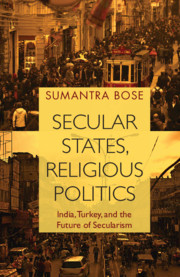Book contents
7 - The Futures of Secularism
Published online by Cambridge University Press: 20 October 2018
Summary
My story is the story of this nation. Either this nation is going to win and come to power, or the arrogant and oppressive minority group, who look on Anatolia with contempt and are alien to Anatolian realities, will continue to remain in power. The nation has the authority to decide. Enough; sovereignty belongs to the nation.
– Recep Tayyip Erdogan in October 2002, just before the national election of November 2002 which brought his Justice and Development Party (AKP) to powerIndia is a secular state with no state religion.
– The Government of India's Attorney-General, at a session of the United Nations Human Rights Council in Geneva, Switzerland in May 2017As the most elementary comparative analysis will show, all nationalism is both healthy and morbid. Both progress and regress are inscribed in its genetic code from the start. This is a structural fact about it.
– Tom Nairn, Scottish Marxist, in ‘The Modern Janus’, an article published in 1975Janus, the god of ancient Rome, had two faces – literally, not in a figurative or metaphorical sense. Sculptures of Janus, and impressions of the deity on Roman coins, invariably show him in profile, with two faces – one looking to the left, the other to the right – mounted on a single neck and sharing the same head. The two faces in profile, looking in opposite directions, were sometimes identical, in other representations not identical but quite similar, but in yet other representations depicted as very different – for example one young, the other elderly; one bearded, the other clean-shaven; one with a benevolent expression, the other with a stern stare. In all these variants, in the ancient Roman version of dharma, Janus symbolized a composite concept of duality – of past and future, beginnings and endings, entrances and exits, war and peace. The Romans worshipped Janus more than any other deity in their homes, palaces, and in temples dedicated to the god. January, the first month of the Roman calendar, is usually said to be named after Janus; looking back and forward at the same time, he was a symbol of change and transitions.
- Type
- Chapter
- Information
- Secular States, Religious PoliticsIndia, Turkey, and the Future of Secularism, pp. 296 - 362Publisher: Cambridge University PressPrint publication year: 2018



